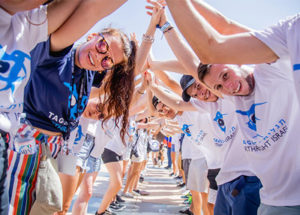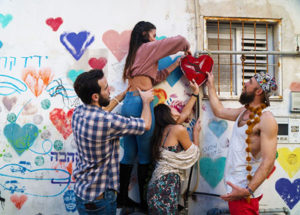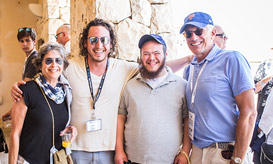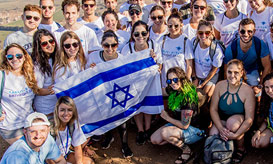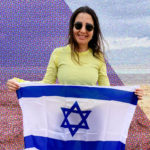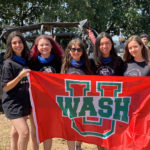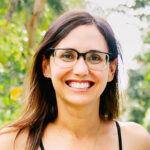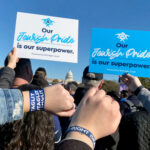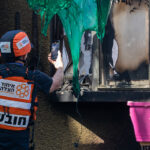Birthright Israel Foundation stands firmly with Jewish students on college campuses and will continue to empower…
As I write this, I’m looking at my hand, where scattered flecks of cobalt blue trace the outline of a Magen David. While this could be an ad for waterproof blue eyeliner – the pigment clinging on for dear life four days later – I find myself now wishing to retrace the lines when I get home.
After all, for centuries, Jews have been forced to identify themselves. From Nazi yellow stars to donkey-shaped patches in 600s CE Baghdad, clothing bells in 1000 CE Egypt to Judenhut (or “Jew’s Hat”) in Medieval Europe, these markers have served to separate, otherize, and physically mark as inferior – as different.
Until college, I’d never physically projected as Jewish. I have blue eyes and a French-Catholic last name (although I did fail to reach five feet). I think I subconsciously wanted to distance myself from any of the distinguishing features used for centuries to demean and humiliate Jews. I remember my visceral reaction when I went to Universal Studios in middle school, the disgust I felt when seeing the animated Gringotts goblins whose grubby hands clung onto coins with faces straight out of the “Protocols of the Elders of Zion.” These stereotypes extend from the hook-nosed Watto (who happens to have a thick Yiddish accent) in Star Wars’ The Phantom Menace to Shakespeare’s Shylock and Charles Dickens’ Scrooge.
In the face of these outward projections and stereotypes – of this iniquitous caricature ingrained in popular culture – we must ask ourselves what we can do. Thousands of years of history has taught us that we will never and can never make everyone accept us.
Yet, there’s been thousands of years of persecution, and guess who’s still here.
The solution therefore is not to cower from our Jewishness – from what identifies us as part of this amazing community. The lessons from centuries of forced separation have been to cultivate a unique identity and recognize our traits that make us special.
These traits are determination, love, and community. It’s a passion for bettering the world and lifelong learning, and then imparting that same joy onto the next generation. It’s why the story of coming to America with nothing and making sure your children have a better life is so common.
It’s not about wallowing in adversity – it’s about taking the lessons learned and then focusing on what we can do to make our present and our future better rather than dwelling on the past. This is how we will overcome the current challenge, and it starts with embracing our identity, with leaning in. It starts with being proud.
I first realized this my freshman year of college, when antisemitism on campus compelled me to go to Israel with Birthright. As I wrote then:
“While I felt tempted to think that as just one person, I couldn’t do anything to help, I decided it was my responsibility to educate myself on the current conflict, which would enable me to then educate others and address the tough questions with newfound insight… My goal was to see what was happening in Israel firsthand so I could come back and be an advocate.”
Three years on, and I wish I could say that the situation on campus was better, not worse. But, I’ve spent the past three years ringing the alarm bell, posting on social media when flyers are passed around saying that Jews are responsible for COVID, or the rock (a local campus art site) is vandalized on Yom Kippur, or protesters line the halls of the business school to block intro sessions for Israeli summer programs like Birthright Excel.
The climate on campuses has been building for years and years, and that knowledge doesn’t make seeing people ripping down posters of kidnapped children or shouting “Glory to Our Martyrs” and “The Resistance is Justified” on the walk to class is any less heartbreaking.
But, what I have also seen these past few weeks, in a way that I’d never before, is Jews coming out in force. Thousands at vigils across campuses. A parents rally at Michigan with a sea of Israeli flags. People that had never expressed interest suddenly flooding their Instagram feeds with educational graphics (perhaps persuaded by the conspicuous lack of posts from those who had been oh so active a couple years ago).
My friends and I discussed how we wanted to start wearing necklaces with Hebrew names or Stars of David, that had been collecting dust since our Bat Mitzvahs. There’s been an outpouring of interest in Shabbat dinners, in going to services, in leaning into our Jewish identities with affectionate pride.
I texted my family that the first thing I want to do when I get home for Thanksgiving is make challah and go to Shabbat services that Friday night, craving my home Jewish community and sense of belonging in a way that I had never before.
They will join me next week in D.C. for the rally on November 14th in what I hope will send waves across the world that yes, we are visibly Jewish, and yes, we are proud of it.
In this environment, showing up counts just as much as speaking out. It could be a bright blue star of David on your hand – as I intend to go back and make it even brighter. It could be a kippah, or a necklace, or just going to local Friday night services.
I don’t see an end to this conflict soon, or an easy solution. I wish there was an answer to the hundreds and hundreds of questions we all have about the future of Israel and Jewish people. I think education and maintaining our core values will get us there eventually, but in the meantime, we must all lean in with an unrelenting sense of love, community, and determination.
It’s time to start being visibly Jewish, and show the rest of the world we’re proud of it.

